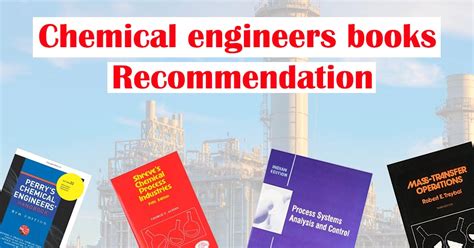Introduction
Chemical engineering is a branch of engineering that applies scientific principles to the design, operation, and control of chemical plants and processes. It encompasses a wide range of topics, from fluid mechanics and heat transfer to chemical reactions and catalysis. As such, chemical engineering is a highly interdisciplinary field that draws on knowledge from chemistry, physics, mathematics, and biology.

Essential Books for Chemical Engineering Students
Unit Operations of Chemical Engineering
This classic textbook by Warren McCabe, Julian Smith, and Peter Harriott is a comprehensive introduction to the unit operations used in chemical engineering. It covers topics such as fluid flow, heat transfer, mass transfer, and separation processes.
Chemical Process Principles
Chemical Process Principles by Olaf Levenspiel is another essential textbook for chemical engineering students. It provides a rigorous treatment of the fundamental principles of chemical engineering, including thermodynamics, kinetics, and reactor design.
Introduction to Chemical Engineering Thermodynamics
This textbook by Stanley I. Sandler presents a clear and thorough introduction to the thermodynamics of chemical engineering. It covers topics such as the first and second laws of thermodynamics, phase equilibria, and chemical reactions.
Chemical Engineering Kinetics
Chemical Engineering Kinetics by J.M. Smith provides a comprehensive treatment of the kinetics of chemical reactions. It covers topics such as reaction rate theory, catalysis, and reactor design.
Chemical Engineering Plant Design
Chemical Engineering Plant Design by Gavin Towler and Ray Sinnott is a practical guide to the design of chemical plants. It covers topics such as process flowsheeting, equipment selection, and safety considerations.
Advanced Books for Chemical Engineering Professionals
Perry’s Chemical Engineers’ Handbook
Perry’s Chemical Engineers’ Handbook is a comprehensive reference work that provides a wealth of information on all aspects of chemical engineering. It is an essential resource for practicing chemical engineers.
Chemical Engineering Design
Chemical Engineering Design by Gavin Towler and Ray Sinnott is a comprehensive guide to the design of chemical processes. It provides a detailed discussion of the principles and methods used in process design, as well as case studies of real-world chemical plants.
Transport Phenomena
Transport Phenomena by Bird, Stewart, and Lightfoot is a classic textbook on the transport of momentum, heat, and mass. It provides a rigorous treatment of the fundamental principles of transport phenomena, including fluid mechanics, heat transfer, and mass transfer.
Chemical Reactor Design and Operation
Chemical Reactor Design and Operation by R. Bruce Bird, Warren E. Stewart, and Edwin N. Lightfoot is a comprehensive textbook on the design and operation of chemical reactors. It provides a detailed discussion of the principles and methods used in reactor design, as well as case studies of real-world chemical reactors.
Process Control
Process Control by Donald R. Coughanowr is a comprehensive textbook on the control of chemical processes. It provides a detailed discussion of the principles and methods used in process control, as well as case studies of real-world chemical plants.
New and Emerging Books on Chemical Engineering
In addition to the classic and essential books listed above, there are a number of new and emerging books on chemical engineering that are worth considering. These books cover a wide range of topics, from the latest advances in chemical engineering research to practical guides for practicing engineers.
Chemical Engineering for the Future
Chemical Engineering for the Future by Mark Anthony Quadrelli provides a glimpse into the future of chemical engineering. It discusses emerging trends in the field, such as the use of artificial intelligence, big data, and renewable energy.
Sustainable Chemical Engineering
Sustainable Chemical Engineering by David Allen and David Wood is a comprehensive textbook on the principles of sustainable chemical engineering. It covers topics such as green chemistry, life cycle assessment, and renewable energy.
Chemical Engineering in the Pharmaceutical Industry
Chemical Engineering in the Pharmaceutical Industry by David J. am Ende provides a detailed overview of the pharmaceutical industry. It covers topics such as drug discovery, drug development, and drug manufacturing.
Nanotechnology for Chemical Engineers
Nanotechnology for Chemical Engineers by Challa S. S. R. Kumar provides a comprehensive introduction to the use of nanotechnology in chemical engineering. It covers topics such as the synthesis, characterization, and application of nanoparticles in chemical engineering.
Bioprocess Engineering
Bioprocess Engineering by Michael L. Shuler and Fikret Kargi provides a comprehensive introduction to the field of bioprocess engineering. It covers topics such as cell culture, fermentation, and bioreactor design.
Conclusion
Chemical engineering is a challenging but rewarding field that offers a wide range of career opportunities. Whether you are a student or a practicing engineer, there are a number of books available to help you learn about the latest advances in the field. The books listed in this article provide a comprehensive overview of the essential and advanced topics in chemical engineering.
